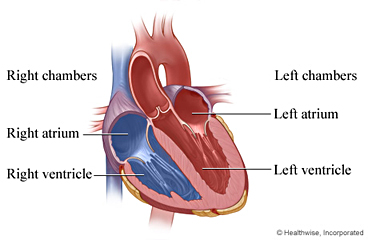
Overview
Your heart has four chambers. The lower right chamber, called the right ventricle, pumps blood to the lungs.
Chronic pulmonary heart disease happens when the right ventricle has to work too hard to pump blood to lungs that have been damaged. The lungs may have been damaged by a condition like COPD (chronic obstructive pulmonary disease), blood clots in the lung, or sleep apnea. As time goes by, the right ventricle may get weaker and not pump blood as well as normal.
Over time, chronic pulmonary heart disease can cause fluid to build up in your body. This buildup can cause fatigue, swelling in the legs and body, and other problems. The damage to your lungs may cause shortness of breath.
You can take steps to feel better and live longer with this disease. These steps include taking medicines regularly, getting oxygen therapy if your doctor recommends it, having a heart-healthy lifestyle, and not smoking.
Follow-up care is a key part of your treatment and safety. Be sure to make and go to all appointments, and call your doctor if you are having problems. It's also a good idea to know your test results and keep a list of the medicines you take.
How can you care for yourself at home?
 Medicine
Medicine
- Your doctor may prescribe oxygen therapy to reduce your heart's workload and help you breathe easier.
- Be safe with medicines. Take your medicines exactly as prescribed. Call your doctor if you think you are having a problem with your medicine.
- Talk with your doctor or pharmacist before you take a new prescription or over-the-counter medicine. Ask if the medicine is safe for you to take. Some medicines can affect your heart or keep your other medicines from working right. Over-the-counter medicines that you may need to avoid include herbal supplements, vitamins, pain relievers called NSAIDs, antacids, laxatives, and cough, cold, flu, or sinus medicine.
Weight and symptoms
- Weigh yourself without clothing at the same time each day. A sudden weight gain may mean that your heart problem is getting worse.
- Keep a daily record of your symptoms. This can help you know if your symptoms change or get worse.
Activity level
- Exercise regularly, but don't exercise too hard.
- Do not start to exercise until you have talked with your doctor to make an exercise program that is safe for you. Ask your doctor if a cardiac rehab program is right for you.
- Watch for signs that your heart is working too hard when you exercise. You are pushing yourself too hard if you cannot talk while you are exercising. If you become short of breath or dizzy or have chest pain, stop, sit down, and rest.
Heart-healthy lifestyle
- Do not smoke. Smoking can make lung disease and heart disease worse. If you need help quitting, talk to your doctor about stop-smoking programs and medicines. These can increase your chances of quitting for good. Quitting smoking may be the most important step you can take to protect your heart.
- Eat heart-healthy foods. These foods include vegetables, fruits, nuts, beans, lean meat, fish, and whole grains. Limit sodium and sugars.
- Limit or avoid alcohol. Ask your doctor how much alcohol, if any, is safe for you.
- If you think you may have a problem with alcohol or drug use, talk to your doctor.
- Manage other health problems such as diabetes and high blood pressure.
- Avoid infections such as COVID-19, colds, and the flu. Get a pneumococcal vaccine shot. If you have had one before, ask your doctor if you need a second dose. Get a flu vaccine each year. Stay up to date on your COVID-19 vaccines.
When should you call for help?
Call 911 anytime you think you may need emergency care. For example, call if:
- You have severe trouble breathing.
- You have a fast or irregular heartbeat.
- You passed out (lost consciousness).
Call your doctor now or seek immediate medical care if:
- You have new or worse trouble breathing.
- You are dizzy or lightheaded, or you feel like you may faint.
- You have sudden weight gain, such as more than 2 to 3 pounds in a day or 5 pounds in a week. (Your doctor may suggest a different range of weight gain.)
Watch closely for changes in your health, and be sure to contact your doctor if:
- You have new or worse swelling in your belly, legs, ankles, or feet.
- You do not get better as expected.
Where can you learn more?
Go to http://www.healthwise.net/patientEd
Enter Z269 in the search box to learn more about "Chronic Pulmonary Heart Disease: Care Instructions".
Current as of: October 2, 2025
Author: Ignite Healthwise, LLC Staff
Clinical Review Board
All Ignite Healthwise, LLC education is reviewed by a team that includes physicians, nurses, advanced practitioners, registered dieticians, and other healthcare professionals.

